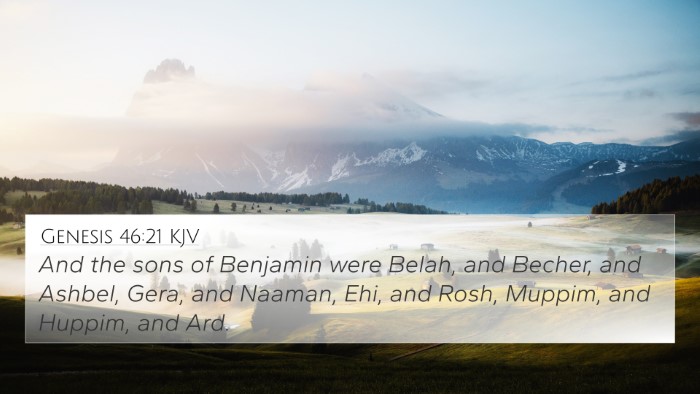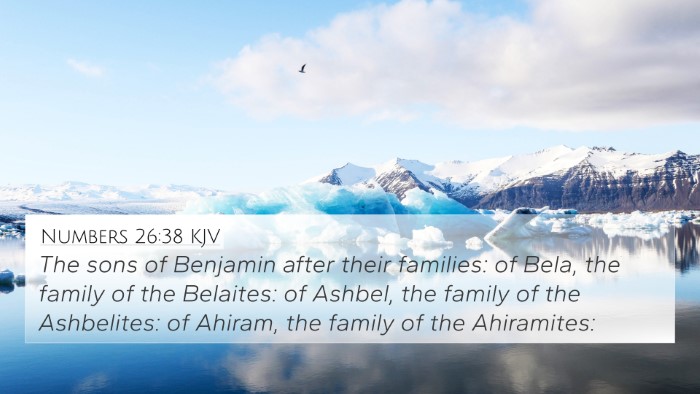Understanding 1 Chronicles 8:1
Verse: "Now Benjamin begat Belah his firstborn, Ashbel the second, and Aharah the third." (1 Chronicles 8:1)
Verse Meaning and Interpretation
This verse serves as a genealogical introduction, establishing the family line of Benjamin, one of the twelve tribes of Israel. Genealogies in the Bible often serve multiple purposes, such as affirming land rights, priestly lineage, and demonstrating God's faithfulness to His promises.
Insights from Public Domain Commentaries
Matthew Henry's Commentary
Henry emphasizes the importance of genealogies in the Scripture. This particular verse highlights the descendants of Benjamin, underscoring God's plan through this lineage. Henry notes that by listing these names, the author is validating the legitimacy and continuity of the tribe, which remains significant in Israel’s history.
Albert Barnes' Notes
Barnes provides a detailed look at each name mentioned. He explains that Belah, Ashbel, and Aharah reflect greater themes of survival and legacy within the tribe of Benjamin. Through this lineage, Barnes points to the fate and role of the Benjamites in various historical narratives, especially in their relationship with the other tribes of Israel, which showcases a pattern of conflict and alliance.
Adam Clarke's Commentary
Clarke approaches the verse with a focus on the context of the genealogies. He characterizes these lists as an affirmation of God's covenant with Jacob and the tribes' continuing significance. He also provides insights into the cultural relevance of names, suggesting that they often reflect characteristics or significant events in the lives of the individuals or their families.
Connections Between Biblical Texts
The genealogical records are not isolated; they illustrate the 'inter-Biblical dialogue' that connects various scriptures. Below are significant cross-references related to 1 Chronicles 8:1:
- Genesis 35:18 - Documents the birth of Benjamin and captures the significance of his name.
- Numbers 26:38-41 - Provides further genealogical information about the tribe of Benjamin's descendants.
- Judges 20:15-17 - Discusses the Benjamite warriors, revealing their military strength and the tribe’s role during a critical conflict.
- 1 Samuel 9:1-2 - Relates to King Saul's lineage, establishing the tribe's importance in Israel’s history.
- Philippians 3:5 - Paul references being of the tribe of Benjamin, linking the New Testament back to this tribe and its significance.
- Jeremiah 1:1 - Mentions Jeremiah as a priest from the tribe of Benjamin, signifying the tribe's ongoing priestly roles.
- Leviticus 25:33 - Discusses the land tenure system and the rights of tribes, including those from Benjamin.
Thematic Connections
1 Chronicles 8:1 is part of broader themes within Scripture that address:
- The continuity of God's promises through generations.
- The importance of lineage and heritage in Biblical narratives.
- The interplay of different tribes in Israel’s history, showcasing conflict and cooperation.
How to Use Bible Cross-References
Using cross-references effectively can enrich your study of the Bible:
- Identify Patterns: Look for recurring themes between genealogical records and their implications on the surrounding texts.
- Understand Context: Cross-references help in understanding the historical and cultural context of events.
- Enhance Study Tools: Utilize concordances and cross-reference guides available to deepen your scriptural understanding.
Conclusion
1 Chronicles 8:1 lays pivotal groundwork for understanding the lineage and significance of the tribe of Benjamin within the grand narrative of Scripture. The interplay of genealogies establishes a historical context that invites deeper exploration of God's covenantal promises and the unfolding of biblical history. Engaging with tools for Bible cross-referencing enhances our ability to discern connections and develop a comprehensive understanding of the text.





